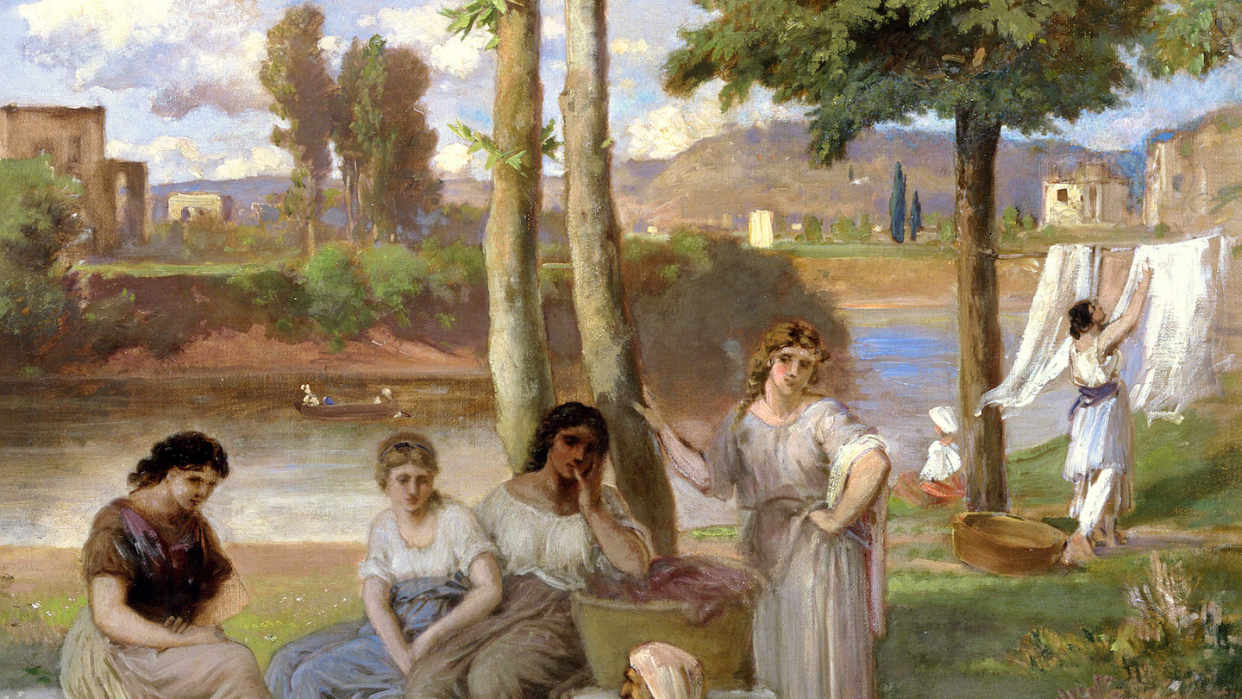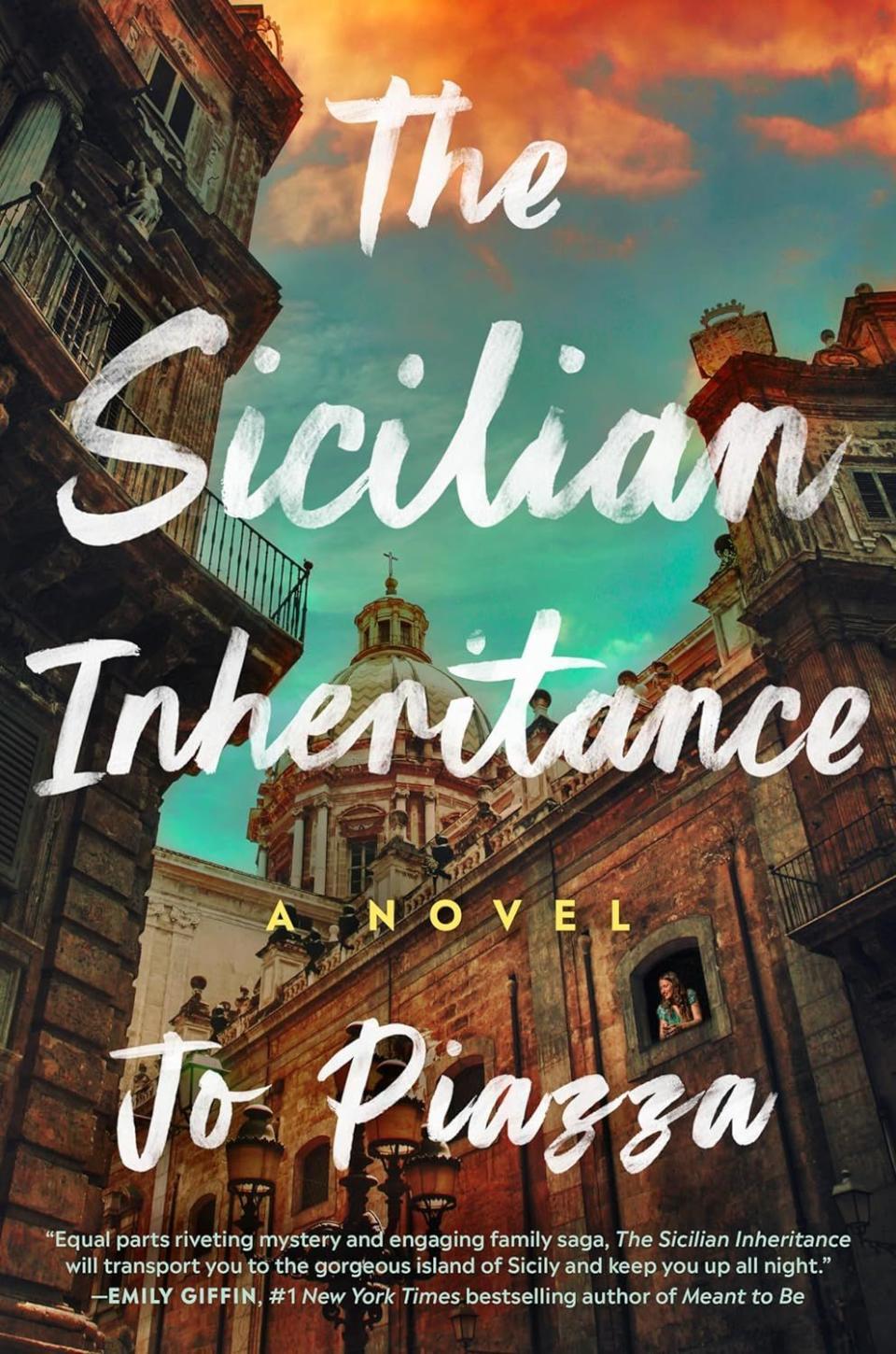What Does a World Without Men Look Like? Ask Jo Piazza.

"Hearst Magazines and Yahoo may earn commission or revenue on some items through these links."
Four years ago, in the depths of the pandemic, Jo Piazza was desperate for an escape: from her house, from her husband, from her kids, from her life. A multi-hyphenate creative—Piazza has authored 12 books, hosted seven podcasts, and published countless pieces of journalism—she turned to fiction, within which she could dream of a return to Sicily, the homeland of her ancestors and her favorite travel destination. “I was like, ‘You are going to write a delicious, spicy, trashy novel. You go get that Colleen Hoover money, girl,’” she remembers telling herself. But a statistic she came across early in her research changed her entire approach.
Between 1880 and 1940, over a million Sicilians, mainly men, left the island for America. Piazza had heard stories about this era and the way the women left behind, including her own great-great grandmother, Lorenza Marsala, took over the work their husbands had handled, from farming to trade. But Piazza hadn’t realized how massive the scope of that shift had been, and as she dived deeper into research, she began to question what it would have been like for these women to finally experience agency after being relegated to domesticity for much of their lives. “I was like, ‘Oh, of course this is a feminist story. Now it has to be about taking down the patriarchy because you can’t help yourself, can you?’’’ Piazza jokes.
The result? The Sicilian Inheritance, Piazza’s historical thriller, published last week. The story centers on Sarah Marsala and her great-grandmother, Serafina, and follows Sarah in 2016 as she visits Sicily to explore an old land deed in her family’s name—which leads to far more questions about the final days of her great-grandmother’s life—and Serafina in the years before her untimely death in 1925. As Piazza succinctly puts it: “Come for the delicious food and the hot sex in a beach cave, and stay for ambitious women taking on the patriarchy and banding together to lift one another up.”
This isn’t the first time Piazza has studied a female-driven society. For her 2017 book How to Be Married, she flew to Shillong, the capital city of Meghalaya, India. The two hill tribes there are matrilineal, which means families’ property and assets are passed to the daughters; children take their mother’s last names; and husbands move into their wives’ homes. “I kept thinking about [Meghalaya while writing] because it was very similar in Sicily,” Piazza says. “Suddenly, the women are in charge of buying and selling the land and raising money to send their husbands and their families to America. Money equals power, and money equals control.”
This “world without men” in Shillong reminded the author of conversations she’d already conducted with Sicilian women during the dozen trips she’d taken to the island starting in her early 20s. Piazza wanted to ask these women additional questions when she started work on The Sicilian Inheritance, but the world was still in lockdown–so all she could do was get them on the phone. “I’m like, ‘We just have to chat. I just need you. I need your voice. I need to hear your stories to make you come alive in my mind,’” she says. The lore matched much of what Piazza had heard about her own great-great grandmother, who was buying and selling her own land in 1913. Piazza’s hypothesis about her family history was further confirmed by academic papers from (and interviews with) historian Linda Reeder, chair of women’s and gender studies at the University of Missouri and author of Widows in White: Migration and the Transformation of Rural Italian Women; photographs Piazza discovered of Sicilian culture in the early twentieth century; and an issue of Vogue from 1925 that captured life in Palermo.

The Sicilian Inheritance
bookshop.org
$27.90
Penguin Random HouseStill, Piazza wondered if there were more elderly Sicilian women who could share specific memories, passed down from their own mothers and grandmothers, about this time period in the early 20th century. When the pandemic eased and she traveled to Sicily last summer, Piazza’s luck struck. She was driving with a friend to meet a photographer who was helping with archival research; there was one parking space available, but it was blocked by a broken chair. Her friend hopped out of the car to move the chair, and—as Piazza tells it—a woman who could have been 100 shouted, “No, no, no!” from her window. She then told Piazza she’s unable to walk and leave her house, so she keeps the chair blocking the parking space so a car doesn’t block her view of the world from her window. The unorthodox encounter allowed Piazza an opportunity to ask the woman about her memories of a Sicily sans men. “Things like that are just serendipitous,” the author says. “You walk down the street, and you find people to talk to.”
Unlike the matrilineal nature of Meghalaya, the Sicilian women’s feminist moment was fleeting. Both the Sicilian government and the church were concerned with the labor drain that came with mass migration. “So they took it out on the women,” Piazza says. “The women who remained behind—Sicily’s so-called ‘white widows’—became the symbols of the heavy price exacted by male migration,” historian Reeder wrote in 2001 about the institutions’ propaganda, adding, “social critics described how young men arranged marriages only to raise the money to buy a transatlantic steamship ticket, and then quickly abandoned their young wives for America, forcing these poor women to turn to relatives, fieldwork, or prostitution. Not only infidelity but also insanity were the inevitable consequences of male emigration.”
And when a woman did stray from what was expected of her, Piazza says honor killings were viewed as acceptable recourse. Piazza’s own Sicilian great-great grandmother’s death in 1916 has long been veiled in mystery: Some relatives say Lorenza Marsala was killed by the mafia for her land; others claim she was killed for being a healer, or witch, and she crossed the wrong person. Today, Piazza’s exploring that history in a nonfiction podcast, also titled The Sicilian Inheritance, which complements her novel.
The tension between freedom and power is the driving force in Piazza’s fiction: women gaining sudden autonomy, and losing it just as quickly. “[The women] weren’t ever really free, for sure,” she says, adding that many joined their husbands in America within five years. “It was a short-lived time in a woman’s life. But it was definitely a time where they had a lot more control and a lot more agency.” And that short-lived time is what Piazza wants to celebrate.
“I like to say we start the book and the podcast with a dead woman, and we don’t end that way,” she continues. “We are celebrating the lives of these women.” Her novel is a love letter to Sicily—its gorgeous landscape and delicious food, yes, but mainly its women. Piazza wants to honor those who came before her: “[We] have so much of the same confidence and ambition running through our veins because of how hard they worked,” she says. “They were so strong and so brave, and we carry that in us today.”
You Might Also Like

